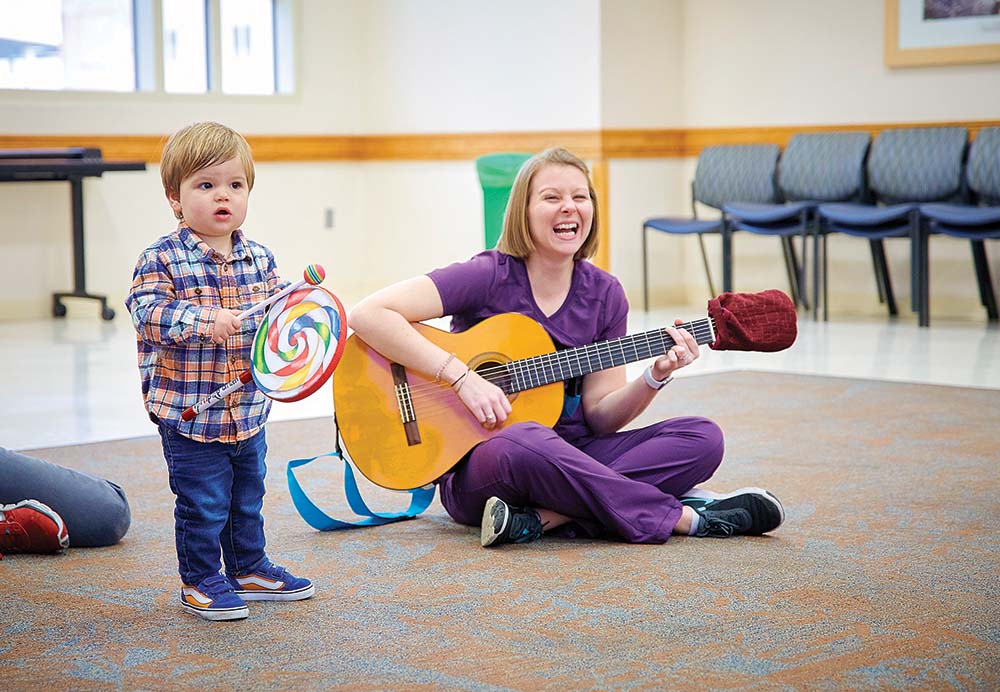Music as Medicine
Therapists’ tools include guitars and ukuleles

Elvis Presley took the stage at Chicago’s International Amphitheater on March 29, 1957, in a gold lamé suit and proceeded to cause 13 girls to faint. One even fainted twice.
Elvis catalyzed a ravenous fanbase, but there may be more to this story than star power. Music, as it turns out, has power all on its own.
The dedicated team of certified music therapists at Tallahassee Memorial HealthCare (TMH) leverages the psychological and neurological impacts of music to address a wide variety of issues in patients of all ages, from the neonatal intensive care unit (NICU) to geriatric care.

Valerie Williams. Photo Courtesy of Tallahassee Memorial HealthCare
Valerie Williams, the director of TMH’s music therapy department, leads a team of four full-time, certified music therapists, five part-timers and two interns who use guitars, ukuleles, piano and other percussion instruments and recorded music to reach clients in ways that only music can.
“In the simplest definition, music therapy is using music to accomplish nonmusical goals,” Williams said.
Anyone can engage with music on a physical level by swaying to a tune or tapping toes to a beat. These movements make people feel more present and alive. There are, however, distinct differences between enjoying music and music therapy. Certified music therapists hold a four-year degree in music therapy or a master’s degree equivalent and complete a 1,200-hour internship. They must also pass the CBMT Board Certification exam to work in a therapeutic setting.
“As board-certified professionals, we have a lot of training beyond just music,” Williams said. “We are trained in counseling techniques, psychology, neurobiology, basic anatomy skills. We look at how the brain works and why the music is working, not just the knowledge that music works.”
Williams and her team develop individual treatment plans, employ flexible intervention options and continually analyze data to measure progress. As part of the TMH ecosystem, Williams and her team operate in every unit in the main hospital as well as outpatient care centers and parent-child groups. Some specialize in particular populations.
Hannah Sellers works in the NICU, using simple lullabies to introduce new stimuli to infants who are otherwise isolated due to their premature birth.

Department director and former NICU music therapist Valerie Williams teaches a parent at the unit how to use Multimodal Neurologic Enhancement to increase tolerance to stimulation and improve neurologic development in premature infants. Photos Courtesy of Tallahassee Memorial HealthCare.
“One of the protocols that we use is the PAL, which is the pacifier-activated lullaby,” Sellers said. “That uses contingent music based on their sucking. So, they suck for 10 seconds and developmentally appropriate music plays. Then we can adjust those settings, making it harder for the music to trigger, so either they have to suck more times or stronger to get that music to play.”
The PAL was invented by FSU’s Dr. Jayne Standley and is now used to teach sucking to infants across the country.
Sellers is especially cautious when working with premature infants. Music therapy offers many benefits, but done carelessly, music can have counterproductive effects.
“Infants in the NICU can’t listen to the same music that we listen to because they’re premature, and their brain literally will stop developing properly,” Sellers said.
These risks are also present in adolescent and adult patients.
“The one that always gets me is blood pressure,” added Michaela Schenkel, another music therapist with TMH. “People get excited when they hear music they like, but you could be working with a patient who’s on five different medications for their blood pressure. Then the nurse comes in because the excitement is raising their blood pressure and heart rate. Socio-emotionally, this is great for the patient, but physiologically, we can’t be hyping them up with their favorite songs.”

NICU music therapist Hannah Sellers helped a mother on the Antenatal Care Unit write a song thanking the medical staff on the unit for the care she received at TMH. Photos Courtesy of Tallahassee Memorial HealthCare.
TMH’s music therapists assist in the treatment of cognitive issues, Parkinson’s disease, emotional issues, lactation support, pain management, stroke and speech therapy among other conditions. Often, music helps to sublimate pain, discomfort and anxiety. Other times, music therapy can establish neurological shortcuts that, to laymen, can appear miraculous.
Processing music, rhythm and sound utilizes both sides of the brain, which can be of great benefit to patients with brain injuries. Patients who have suffered a stroke or traumatic brain injury may lose the ability to speak, but through music therapy, many can learn to communicate by singing.
“Speech and singing essentially get to the same place in the brain, but they take different routes,” Schenkel explained. “Think of it like this, if you know the way to your house, there’s probably a road that you always take, and you don’t have to pull up a map to get there. You might know a couple of other ways to get to your house. Let’s say that route you always take just does not exist anymore. That doesn’t mean that you can’t get to your house.”
The music therapy department at TMH began in 1995 with a single therapist funded by Florida State University. At that time, the department served to fulfill internship requirements for FSU music therapy students, but having seen the positive impacts of music therapy firsthand, TMH, FSU and other charitable organizations have invested more and more funding to support the department.
Williams and her team hope that trend continues.

